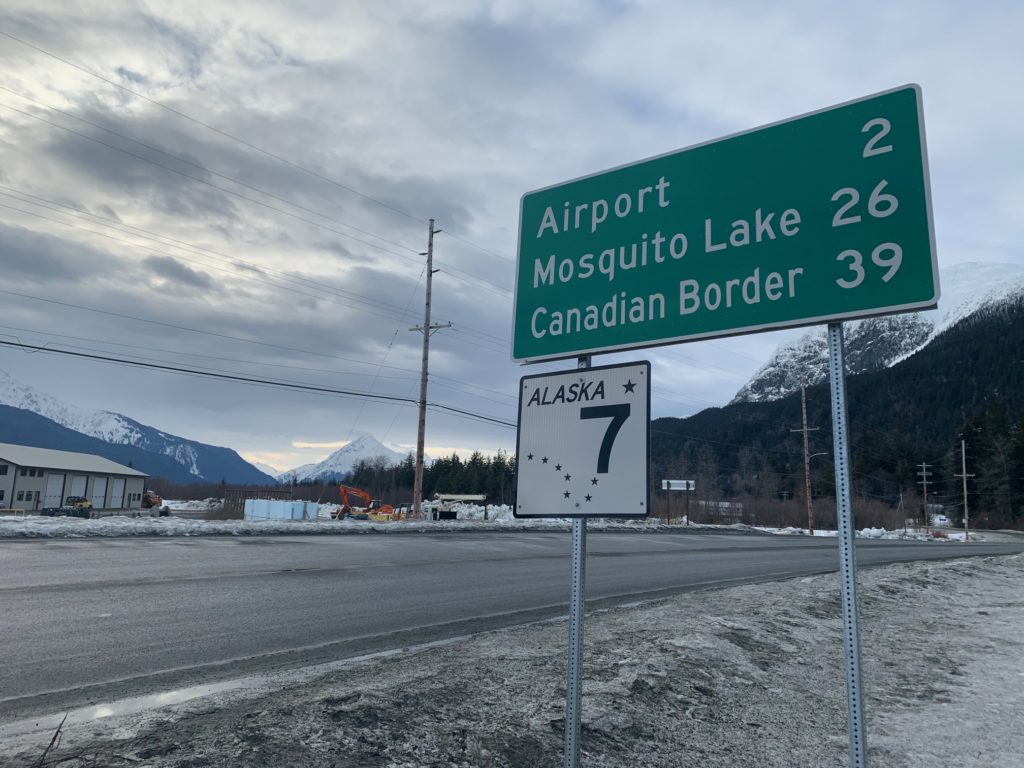
Kathryn Miller and her boyfriend were just trying to get home to Juneau with a truck they’d purchased in Anchorage. But at the Canadian border they were forced into a 400-mile U-turn.
Their drive back was filled with blame and self-recrimination.
“There was all this infighting between us, right? Because you’re like, ‘Oh you should have said this,’” Miller, 27, recalled later. “We were joking that we went through the five stages of grief.”
Canada imposed a new border policy this month. It requires Alaskans transiting the country to take the most direct route, with time limits. It also continues the ban on non-essential travel. But the thing is, you can’t know in advance if your reason qualifies as essential because it’s up to the officer at the border to decide, and that may be hundreds of miles away.
Until the encounter at the Beaver Creek crossing on July 26, Miller thought everything about their trip was essential. Miller and her boyfriend, Steve Garger, are civilian mariners and live in Juneau. She works for the state ferry system. They both had to go to Seward for training. They decided to fly to Anchorage, buy a truck, do their course and exam in Seward and then drive back. That meant transiting 300 miles of Canada to get to Haines, where they expected to board the LeConte to ferry back to Juneau.
Miller did her research. She called the Canada Border Services hotline and was assured that Alaskans going home is considered essential travel. She also talked to a colleague who’d just made the journey
“She said, ‘Oh, I got through like a breeze,’” Miller recounted. “And she was going the other way, Right? She was leaving on her trip. We were just trying to go home.”
Did we mention they picked up Miller’s 18-year-old sister in Valdez? She was coming to live with them because she wanted to attend University of Alaska Southeast.
So there were three of them in the truck. Wearing masks, with a full tank of gas and hand sanitizer at the ready, they approached the border at Beaver Creek with all the documents they thought they needed. Miller and her boyfriend had driver’s licenses showing they lived in Juneau. They had tickets for the Haines ferry. They had proof they’d booked lodging for that night back on Alaska soil, in Haines. Clearly, the border officer would see they weren’t going to fool around in Canada, right?
“Steve, my boyfriend was like, you know, ‘We’re just transiting through. We’re staying in Haines tonight,’” Miller said. “And the guy just interrupts and goes, ‘No, you’re not.’”
The officer took their passports and returned a few minutes later with documents that said “Return to U.S.”
That’s when they found themselves cycling through the grief stages.
“First we were in shock and denial,” Miller said. “And then we turned on each other.”
U.S. Sen. Lisa Murkowski has heard other tales of border woes. She said she’s been asked to help Alaska parents who want to drive their kids to the Lower 48 for their freshman year of college.
“And it is determined that it might be essential for that student to get through, but not necessarily for the traveling partner,” Murkowski said at a constituent Town Hall. “Well, as a parent, believe me — I can relate to the anxiety and the stress that this is causing.”
Murkowski said it’s a tough problem to solve because Alaskans have to respect Canada’s efforts to protect its citizens from the pandemic.
A spokeswoman for the Canada Border Services Agency said she can’t discuss individual cases but confirmed the officer on scene is the ultimate authority.
“In all port of entry cases, the final decision is made by a Canada Border Services Agency officer, based on the information available to them at time of processing,” she said in an email.
Miller, as a ferry officer, understands why it’s important for an officer to have the power to decide. Still, she wonders why her party didn’t pass muster. Was it her sister’s presence that made them ineligible? The border officer didn’t offer any clues, and Miller said there’s not a lot of information about Alaskans wanting to transit Canada to move from one part of the state to another.
The worst part, Miller says, was the first stretch of road after they turned back: No cell phone service.
“You have hours where you can’t make any plans,” Miller said. “You can’t look at the ferry schedule. You can’t look at the flight availability. You can’t look at the barge. You’re just sort of like sitting there, stewing.”
This story has a happy ending of sorts. After they left the truck in Anchorage and flew back to their jobs in Juneau, Miller wrote a lot of letters. She wrote Alaska’s congressional delegation, the Canada Border Services Agency, the premier of Yukon Territory and Canadian Prime Minister Justin Trudeau. She’s not sure if any of that did the trick, but a supervisor at Canada’s Beaver Creek border station called her and said he would clear her to cross the border.
Miller didn’t take him up on it. Instead, she flew to Anchorage and drove to Whittier, where she boarded the Kennicott — the ferry she normally works on. She and her 2006 Dodge truck disembarked in Juneau Wednesday afternoon.
With the change of itinerary and last-minute flights, she’s out several hundred dollars and two vacation days.
Lesson in overcoming obstacles? Priceless.